Introduction
As a performing arts student within a school based sixth form, the popularity of the subjects and the opportunities available within them are of significant value to me. As an individual who can play the guitar, has a keen interest in the theatre and has been a member of stage crew for five years (and is currently extending those skills within A Level Drama & Theatre) the popularity of the arts directly affects the opportunities that are available to me (it's quite simple really: more students, more shows to be technically involved in). Throughout my time at school and sixth form, I have observed a variety of changes within the performing arts departments (such as staff changes/turnover, number of opportunities and general class sizes). My curiosity grew as to whether this was affected by political factors, such as those I would read about in the news; which resulted in me choosing to investigate this particular issue.
I believe that the arts provide opportunities to enrich and develop personal qualities and skills (as discussed below) that the more 'academic' subjects simply cannot reach, especially when these skills can be applied to the 'academic' subjects. I believe that the accessibility and the opportunities to take part within the arts is of significant importance to young people in my area, nationally and internationally. I in no way believe that the arts should be forced upon young people, but sufficient opportunity should be available for young people to take part if they wish and their access to these opportunities should not be restricted by any means.
The skills the arts encourage are valuable, but their value is not restricted to just within the arts, as they are the skills, which almost every employer globally is seeking (as shown from various articles on careers advice websites and from research by professional arts societies). The ability to be creative, solve problems and innovate, are vital in today's ever-changing world. Take Steve Jobs, a technological genius, but without creativity how would he be able to innovatively design the Macintosh, iPod, iPhone and iPad? The arts build self-confidence, allowing people to step out of their comfort zone, and by encouraging self-expression: useful for public speaking amongst many other activities. Furthermore, the ability to work with others, to focus, to become dedicated and to receive constructive feedback is enriched and powerfully developed along with the ability to read and understand other people who we interact with within society.
Joshua Lewis-Handley
The statistics
For the purpose of this investigation, reference to the 'arts' or the 'performing arts' includes Art, Dance, Drama, Expressive Arts, Music and Performing Arts.
Unfortunately, the effect of some reforms cannot be assessed nationally using statistics, this is due to the fact that some of the examinations for new specification arts qualifications are yet to be sat. However, I have managed to gather some internal data from my school as well as data from other various sources.
Most of these changes were incited by the Conservative government's victory in the 2010 general election, when Michael Gove took office as Education Secretary. He almost instantaneously and continuously unveiled countless education reforms that were vast and grand in scale in comparison to the previous Labour government: a complete overhaul. These changes were continued and heavily supported by Gove's successor, Nicky Morgan who replaced him in a cabinet reshuffle in July 2014 (she has since been replaced by Justine Greening when Theresa May took office and reshuffled her cabinet following David Cameron's resignation following the result of the EU referendum).
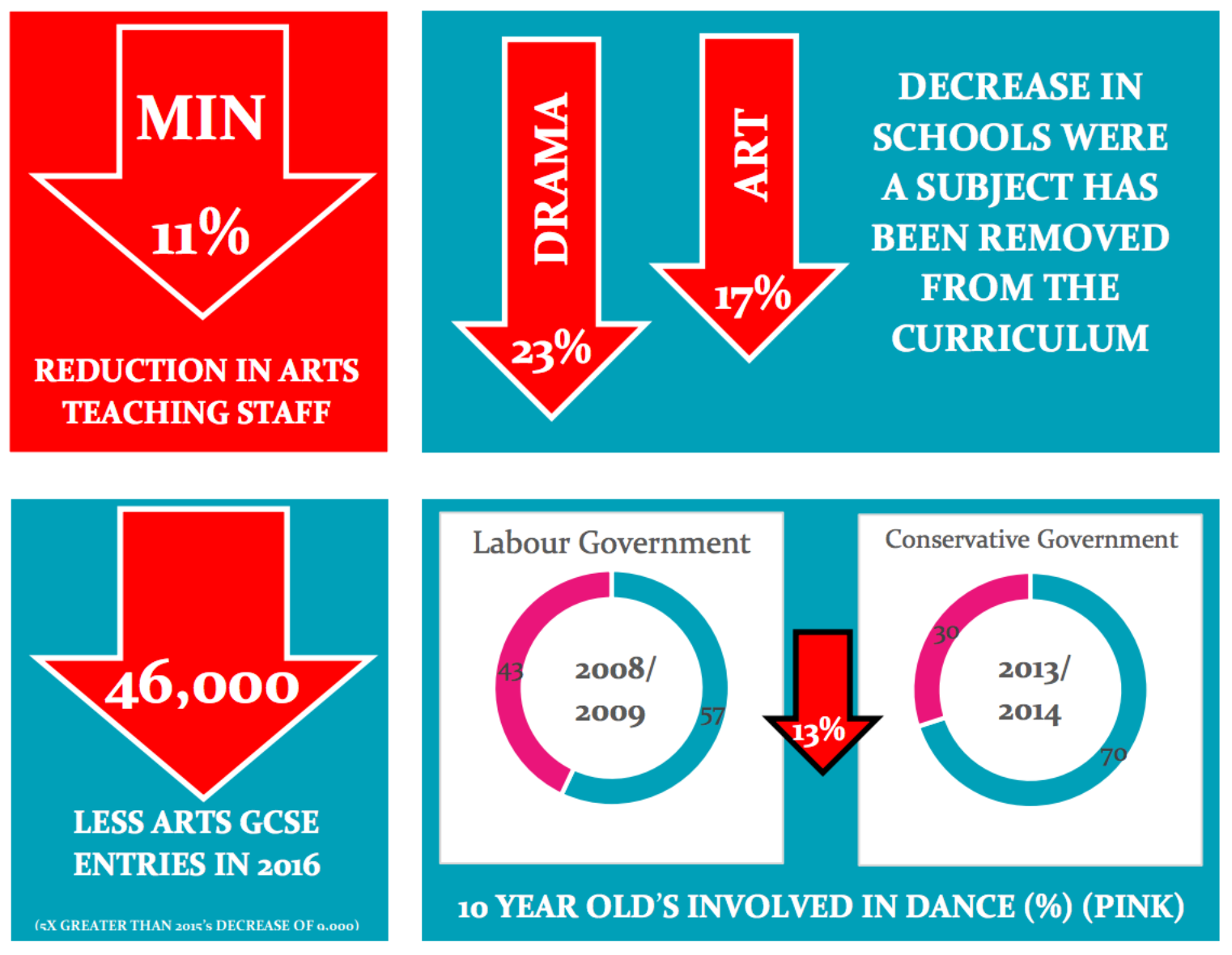
- THE WARWICK COMMISSION – February 2015
Decline in Arts subjects at GCSE:
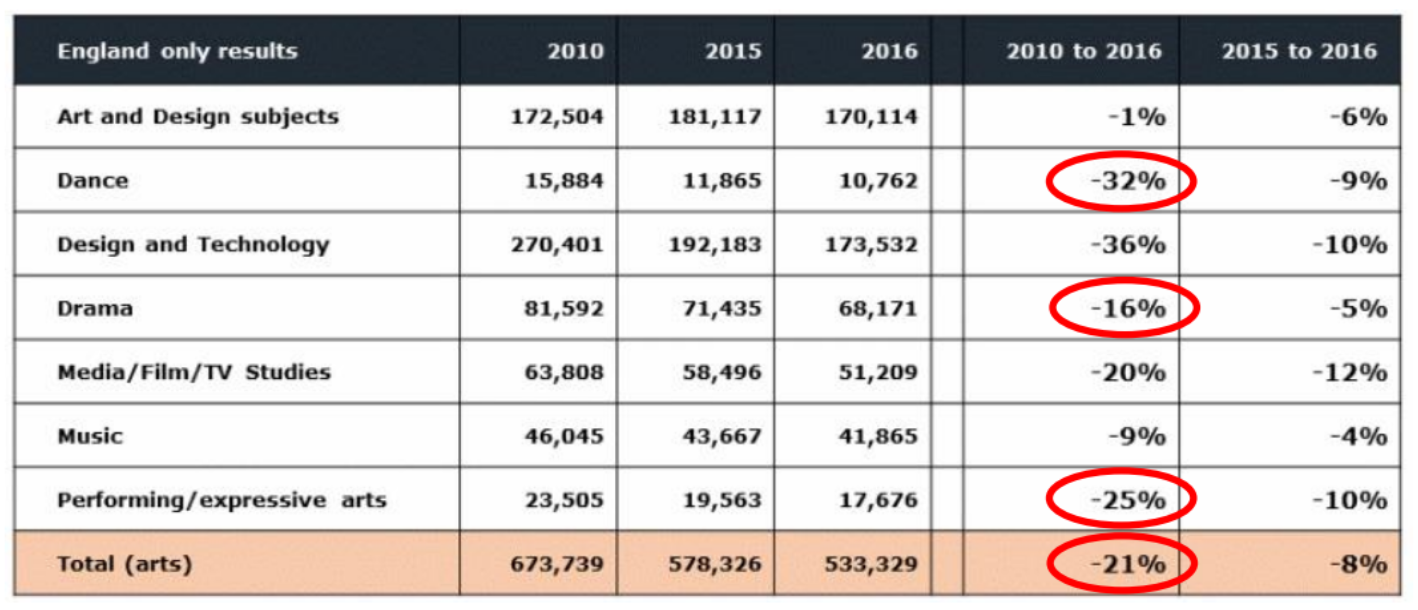
- BACC FOR THE FUTURE - 2016
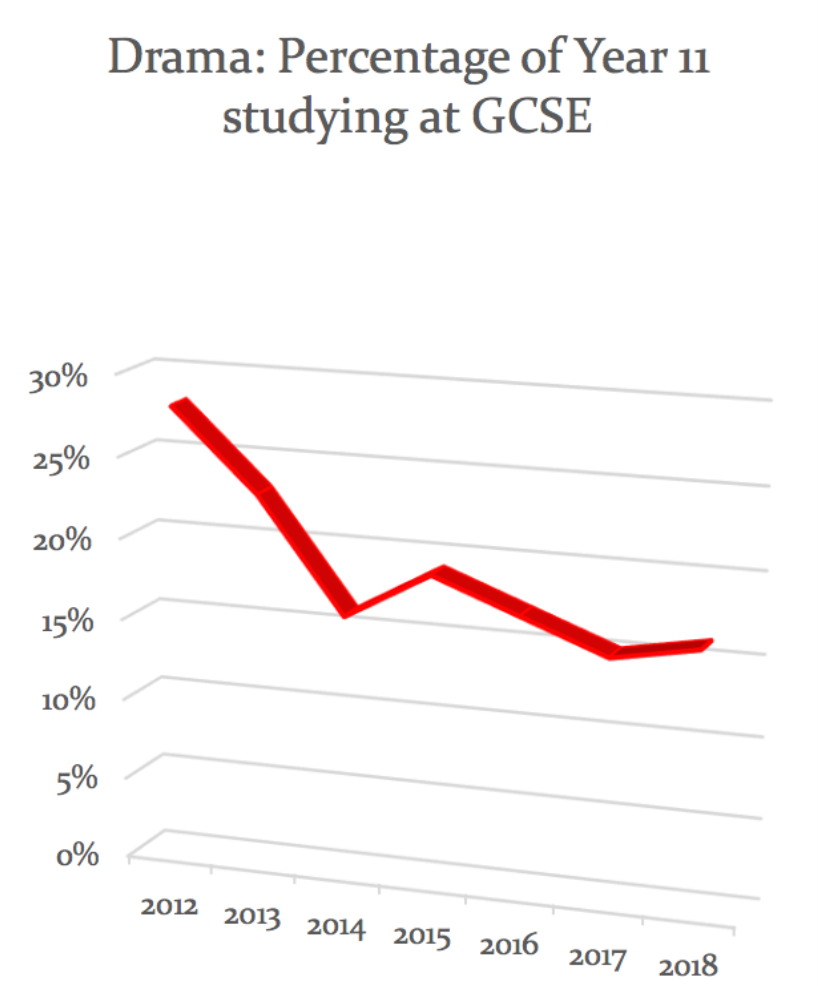
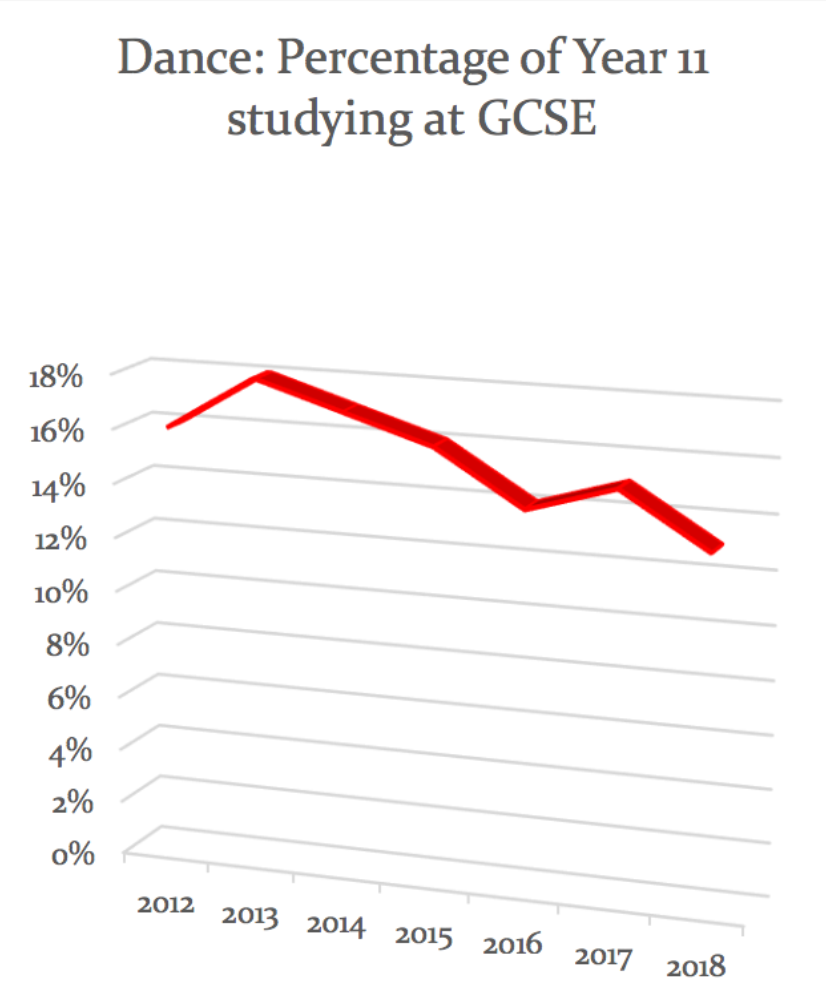
- Table 1. Sharp decline in Drama entries at Alderbrook. Especially between 2012-2014 where policies started to take effect.
- Table 2. Steady and gradual decline demonstrated in Dance entries at Alderbrook. Especially from 2013-2016, 2017 contradicts the trend before 2018 compensates for the equivalent average reduction.
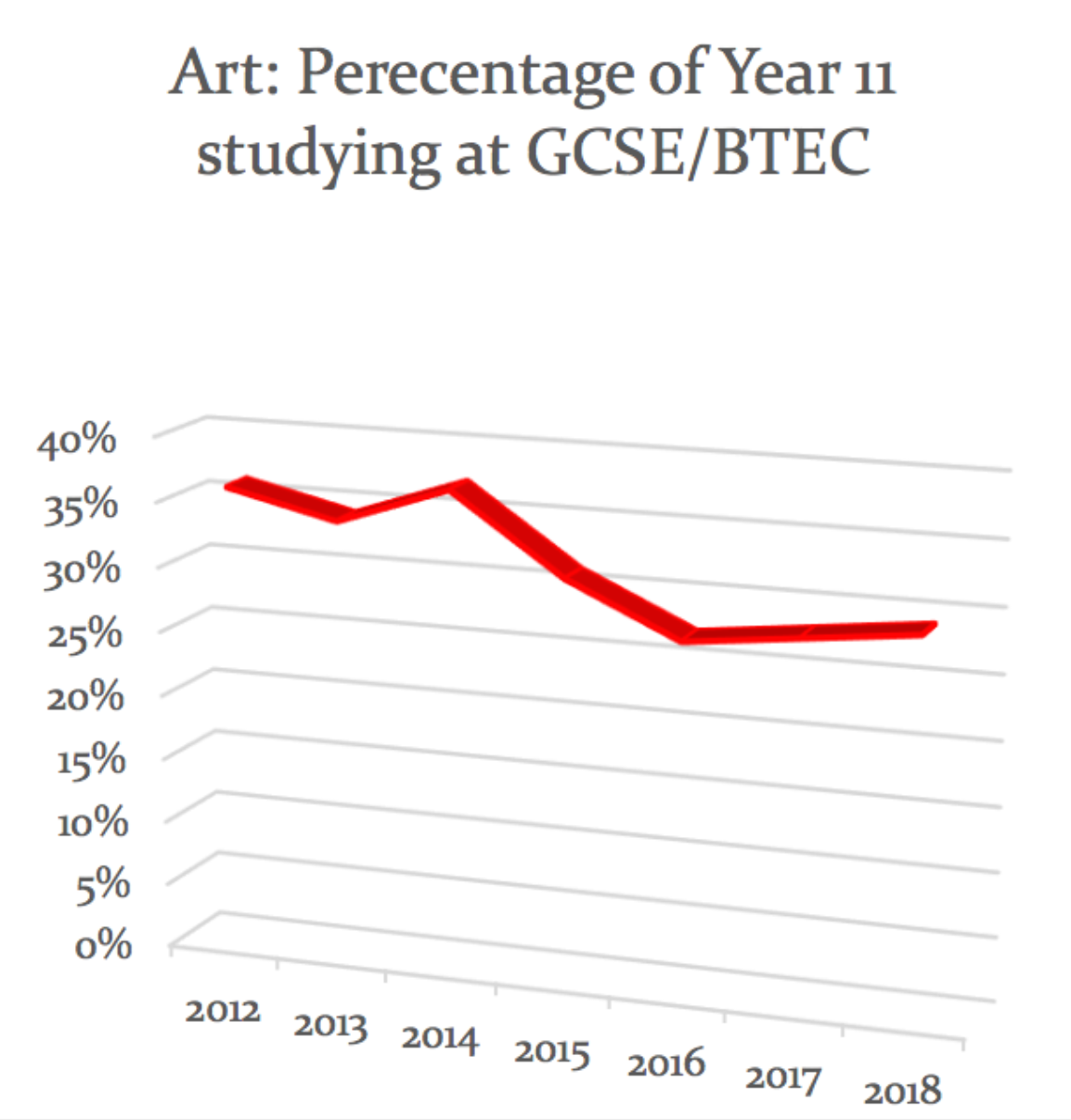
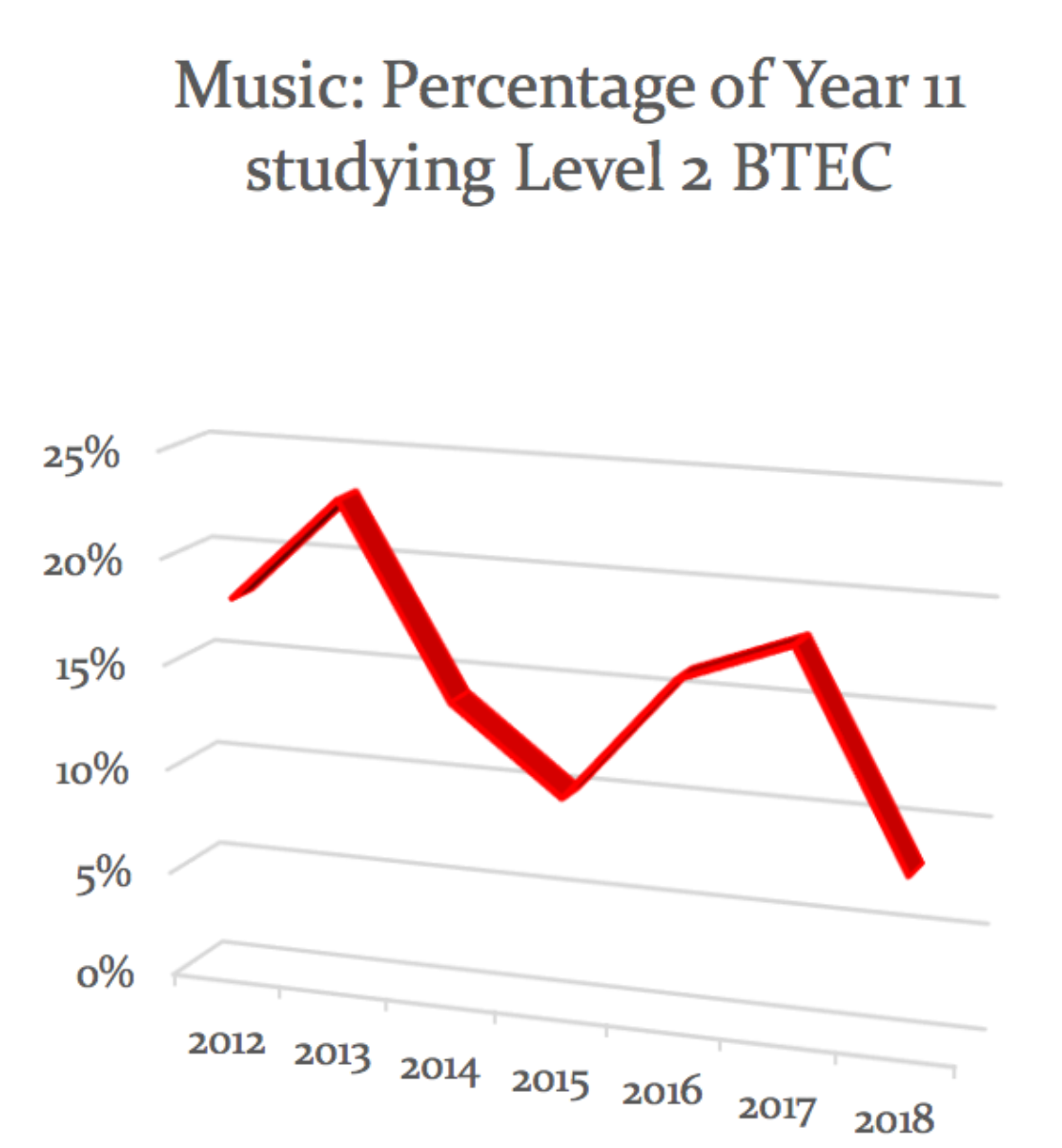
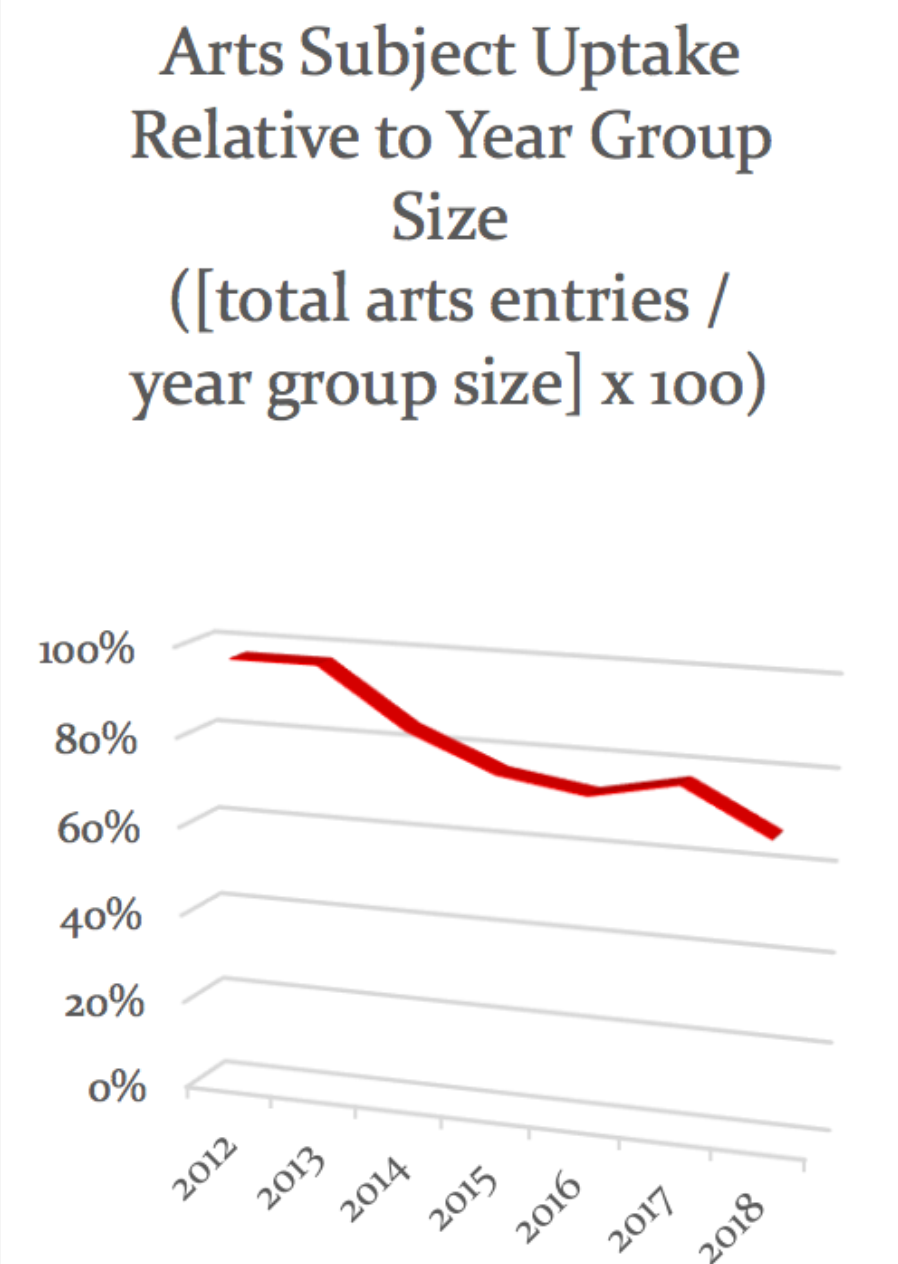
- Table 3. Greatest reduction for Art at Alderbrook is shown between 2014 and 2016. The percentage has remained relatively stable between 2016-2018.
- Table 4. Music at Alderbrook has shown the most volatility. A huge reduction occurred between 2013 and 2015, followed by a period of recovery between 2015 and 2017 but then a sharp decline in 2018.
- Table 5. Arts at Alderbrook have shown a gradual decline over the period of the conservative government reforms. Falling from an approx.. 95% uptake rate to just above 60%.
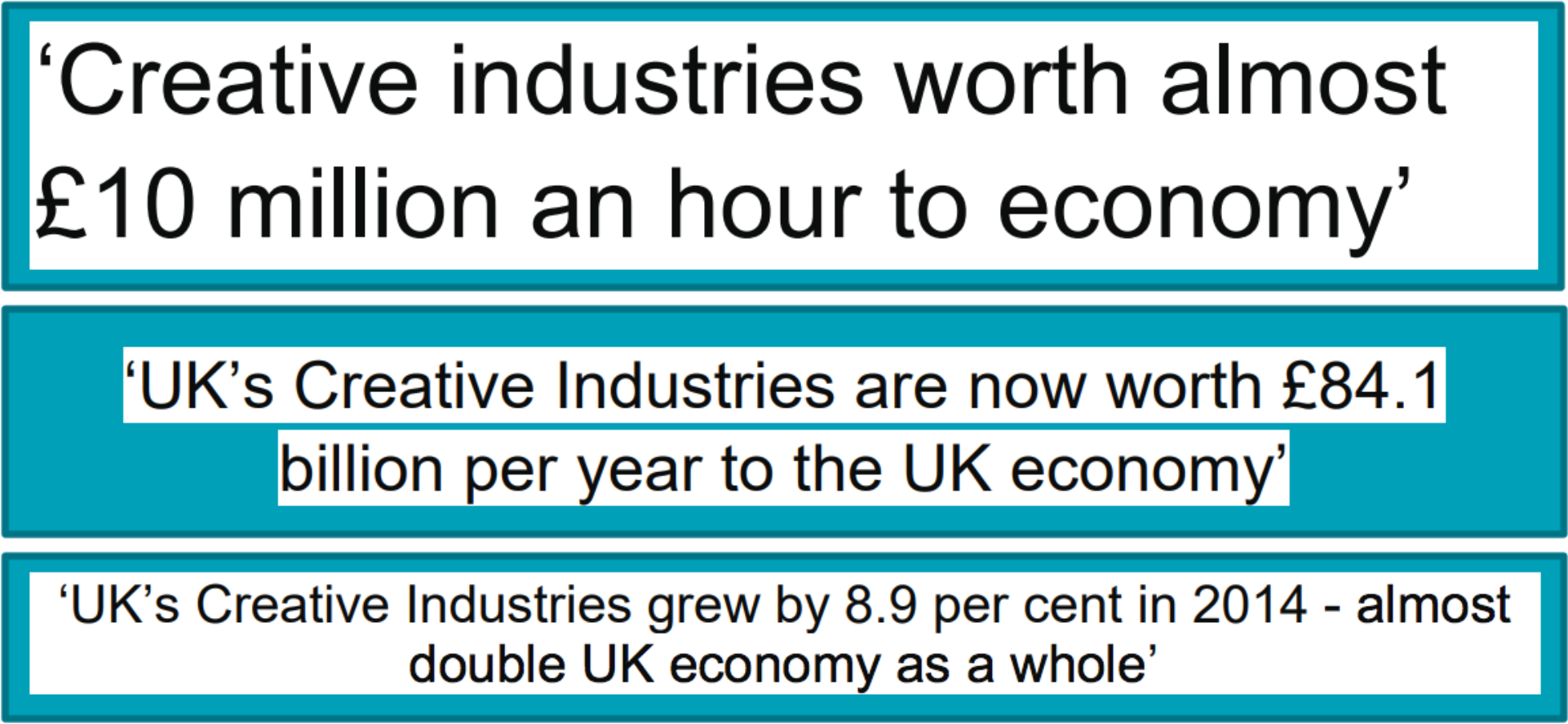
- ARTS CONTRIBUTION TO THE UK ECONOMY- GOV.UK – JANUARY 2016

- IMPORTANCE OF CREATIVE INDUSTRIES POST-BREXIT – JANUARY 26TH 2017
These press releases show the sheer importance of the Arts to the British Economy, therefore why it is important that Britain continues to produce artistic talent, which means encouraging and enriching the arts within our education system.
The EBacc Explained
As I stated in the previous section, 2010 was the year which sparked a total education overhaul: the Tories came to power, Michael Gove became Secretary of State for Education and major change was promised from Cameron's newly-elected government.
The first major idea unveiled by Gove back in 2010 was the English Baccalaureate (often referred to as the EBacc): a performance measure which measures the percentage of UK students attaining A*-C in 5 'core' subject areas at GCSE level. Gove and the Conservative government defined 'core' and 'academic' GCSE subjects as: English, Maths, Science (at least 2 must be studied), History/Geography and an ancient or foreign language. Gove, thought this would be the most effective method of combatting the decline of GCSE entries in science, language and humanity subjects.
This performance measure wasn't a big issue to start off with as it was simply a 'recommended' combination of subjects that students should take to keep their 'options open' after secondary school. However, school league tables have also now been reformed (Source: https://www.gov.uk/government/publications/english...). One of the main features is the percentage of students studying the EBacc at the institution. Are school league tables designed to 'rank' schools and educational establishments based upon their competence at providing a highquality education to the young people that are this country's future; the opportunities provided to them, the quality of teaching and the outcomes the students achieve? What has the number of students studying seven GCSE 'academically rigorous' subjects got to do with the quality of education a school provides? Is there a proven link?
Furthermore, to make the EBacc even more prominent, the study of the EBacc by GCSE students in the UK was made compulsory by the then education secretary, Nicky Morgan, from September 2016 (apart from in the case where a student has special educational needs) (source: gov.uk). Many argue the government has now created a new mandatory education construct that restricts and limits what UK schools can teach: and if a school does otherwise, they're penalised for it in those 'all-sacred' league tables.
So how does the EBacc affect the arts curriculum? The answer is relatively simple: by making so many subjects compulsory, it leaves little room for optional subjects and therefore the arts. A student will now only have one or two free-option choices when they receive their option blocks/pathways in year 9 (or year 8 in some schools). This will result in many students who would have wished to pursue an arts subject at GCSE unable to do so thanks to restricted choice. Less students will opt for the subjects (see the statistics, this has happened nationally and at Alderbrook in some areas, with Dance and Drama mostly affected), resulting in it becoming less feasible to offer extra-curricular opportunities (some volatility has been present at Alderbrook, but they have become very strong this academic year) and trips (to the theatre for example, which luckily hasn't PAGE 7 occurred at Alderbrook), budgets will get cut as interest decreases and eventually arts teachers will lose their job security.
This has happened in some smaller institutions, and when those arts teachers are no longer employed at the school, the performing arts leave the school with them. (See the statistics section where I quoted the Warwick Commission Report)
Many bloggers have voiced their opinions of the EBacc online and I have took the time to read many of them to try and comprehend what the general consensus is surrounding the EBacc. Most people who criticise the EBacc are asking what evidence and reasoning is there for the '5 core subject areas' being deemed compulsory for the EBacc? Laura McInerney, an education writer, is also asking the same thing and in an article on her blog she explorers some of the possible reasons. One of the reasons she states is that these subjects are known as 'facilitating subjects' at A Level by the Russel Group of universities. 1. To clarify this is at A LEVEL. 2. You require two of the subjects, not 5! To build on this, the Russell Group like these subjects at A Level because they are the core subjects for entry to degree level courses; however, to read Geography at Oxford, Geography is not required at A Level, therefore disproving this 'core subject' formula. Furthermore, some politicians constantly refer to the EBacc subjects as 'rigorous', but to contradict this a study by Coe at the CEM Centre states that GCSE IT and Business Studies is deemed more difficult than GCSE geography. So therefore, there seems to be no clear, logical reasoning as to why the subjects were selected.
An observation I made, and after further research others have also made, is how the EBacc seems to resemble the IB (International Baccalaureate). The IB is an alternative to GCSEs and A Levels which is commonly taught in British International Schools. It consists of option areas and students choose a subject from each area and receive a broadened education as a result. The subject areas are essentially compulsory categories within the curriculum (sound familiar?). For a fair comparison, I will use the IB programme which is designed for teaching within secondary schools.
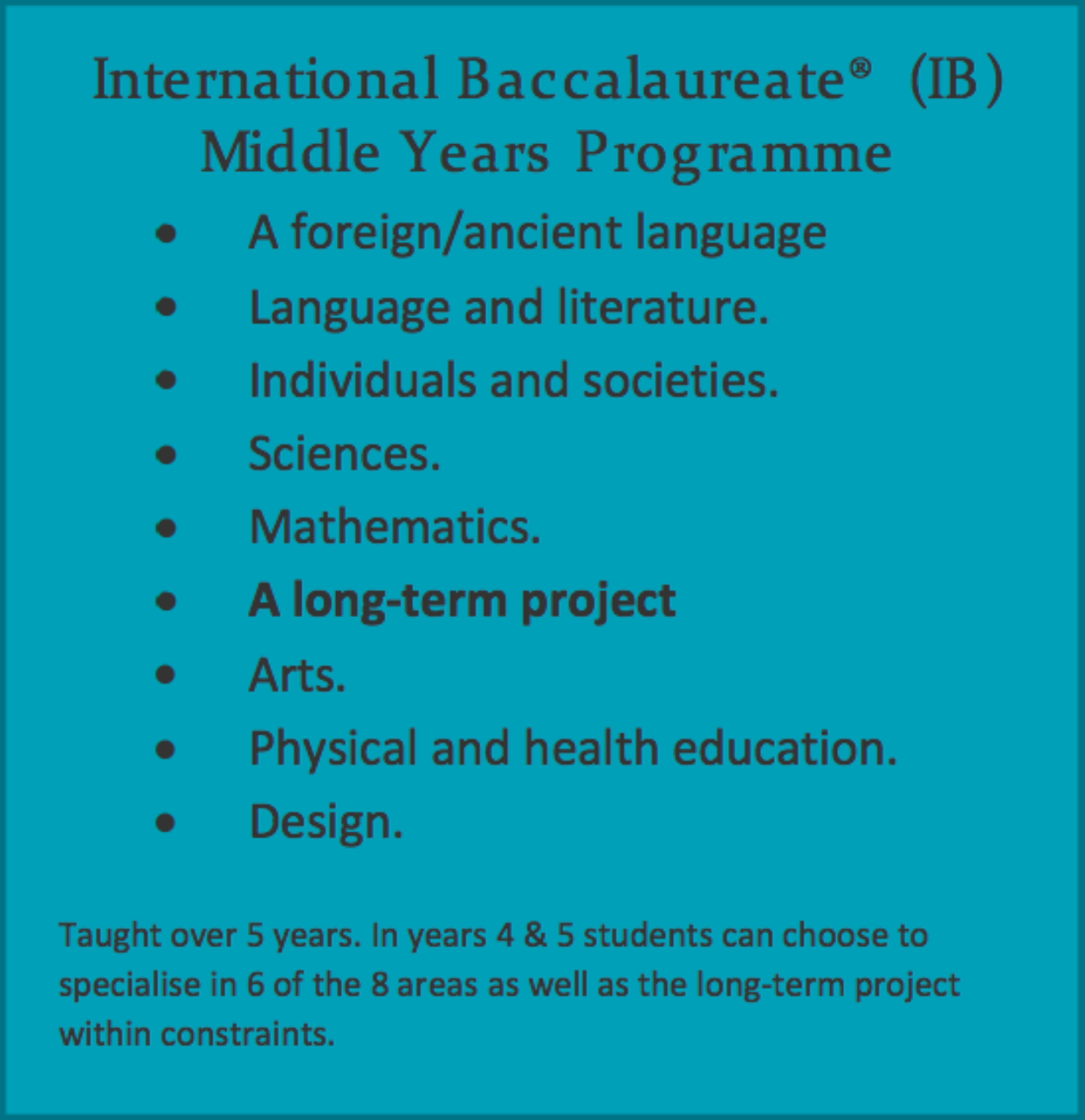
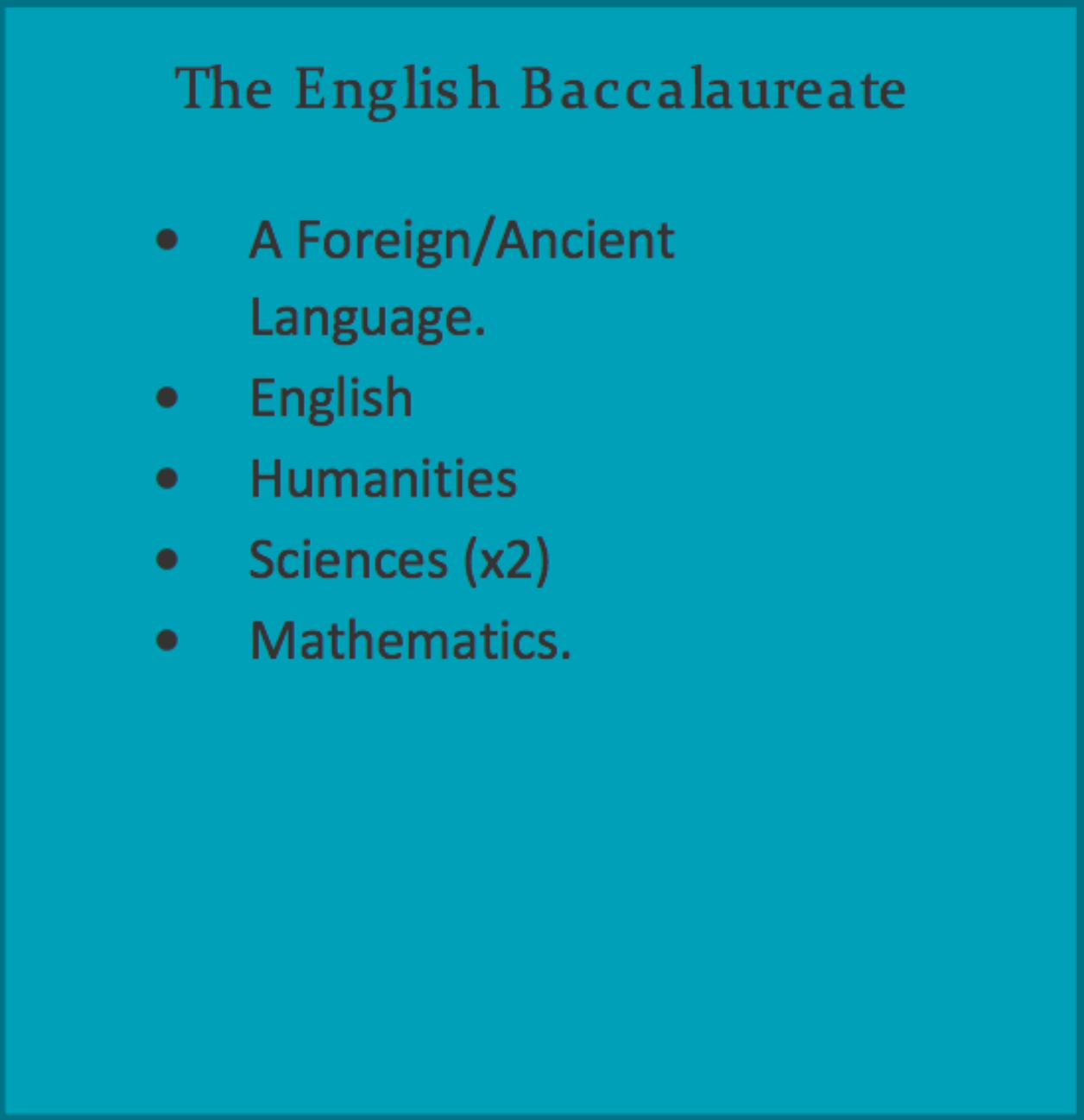
Based upon the side-by-side summary I have created, the two do seem very similar. However, it can be immediately argued that the IB has far more breadth than the EBacc with all subject areas accounted for.
One of the most prominent campaigns opposing the EBacc is 'Bacc for the Future' who are campaigning against the EBacc in its current form and are asking the government to reconsider or to explore alternatives which won't give schools the opportunity to remove the arts from their curriculum. An alternative they have shown support for is Lord Kenneth Baker's (chair of the Edge Foundation) idea of a '14-19 Baccalaureate' with more breadth. The basics of the idea are outlined below.
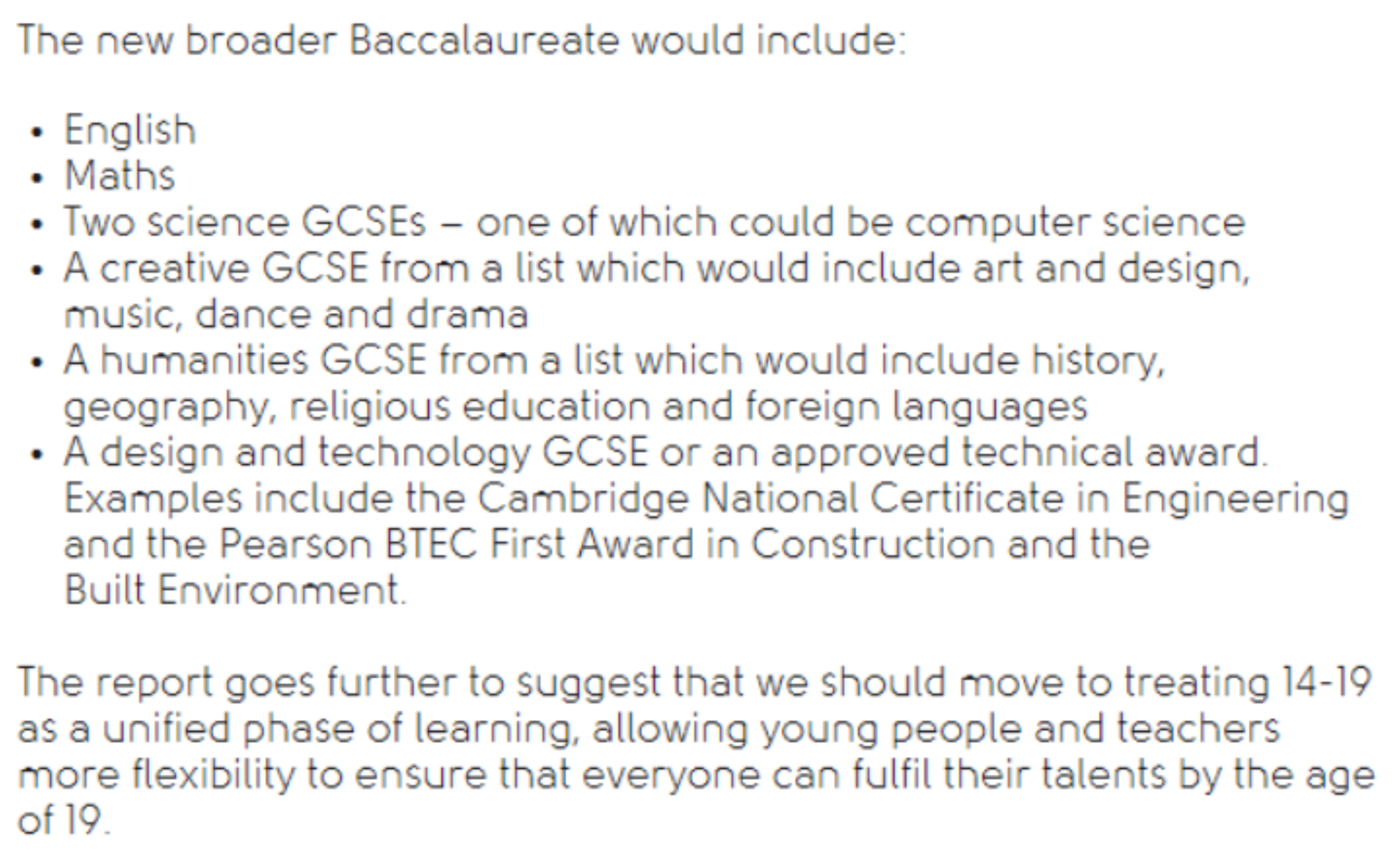
- Source: The Edge Foundation
I do not totally agree with the proposal as I think the subject areas are still not the best selection and I certainly do not agree with merging the 14-16 and 16-18 stages of education. But I do think it is a step closer to a broader education compared to the current EBacc. My idea for a solution would be:
- English GCSE (Language & Literature combined for lower ability students or separate for higher ability)
- Mathematics GCSE (further maths available as an additional option)
- Two Sciences (including Computer Science. Lower ability students can take applied or vocational alternatives).
- An Extended Project or Enrichment Qualification
- A creative qualification (Art, Music, Dance, Drama or a D&T option. GCSE or vocational equivalent)
- A Humanity or Social GCSE (Geography, History, Religion, Psychology, Sociology, Politics. Or a modular course combining the main concepts from many of the subjects)
- A Modern/Ancient Language GCSE
- A Business/Workplace qualification. (business, finance, administration, basic ICT)
Of these areas, English, Mathematics, 2 Sciences and an extended project would be compulsory. The student can then choose to study a minimum of 3 more subjects (but you cannot do more than one subject from the same category) from the Arts/Design, Source: The Edge Foundation PAGE 9 Social/Humanity, Modern/Ancient Languages, Business, Sciences or a Further Mathematics GCSE. The school can choose how many subjects a student opts for depending on how much time they have on the timetable and the student's ability. Each student would leave with 8 GCSE level qualifications and an Extended Project. I have also allowed for there to be a combination of vocational and GCSE options for some subjects so students get the best way of learning for their subject as some subjects simply require a more practical stance! Again, my solution may not be ideal as I am no expert on education but I would be interested in your viewpoints on my idea or your ideas of an alternative.
To conclude this section, I believe this reform has played a huge part in the reduction of the arts in British schools. I deem it to be a highly damaging reform to culture, individuals and society as we are discouraging expression, personal skills and career paths into a huge part of our economy as a result.
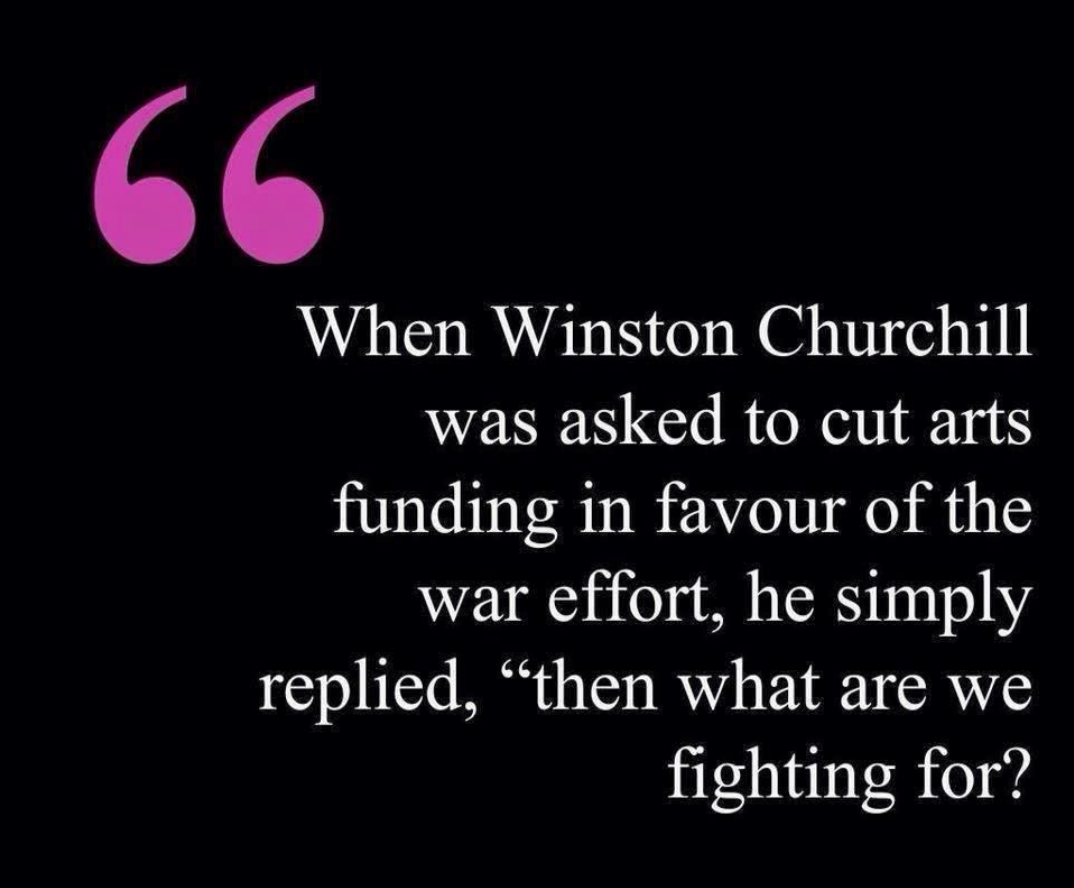
This quote shows the historical important of the Arts to British culture and the economy. Churchill believed that Britain was fighting a war for freedom of expression, which the arts provides, therefore why should we stop encouraging this now when it has been so vital for generations?
GCSE and A Level Qualification Reforms
In this section, I will be discussing the newly reformed GCSE specifications whilst touching upon the AS and A2 specifications that have been reformed. I will be explaining the main features that have changed and how they affect the students who are studying them with a deeper focus on the arts subjects later on.
One of the main features that has changed in the new GCSE specifications is a new grading scale of 9-1 where a grade 9 is the highest attainable grade. The government claim that the new scale will provide 'greater differentiation, especially amongst higher achieving students' as well as setting a 'higher benchmark and standard than the previous C grade' (a grade 5 (high C/low B) is the new standard). The chart below summarises the equivalency between the two grading scales. NOTE: SINCE THIS CHARTS RELEASE THE BENCHMARK FOR A GOOD PASS IS NOW A 4.
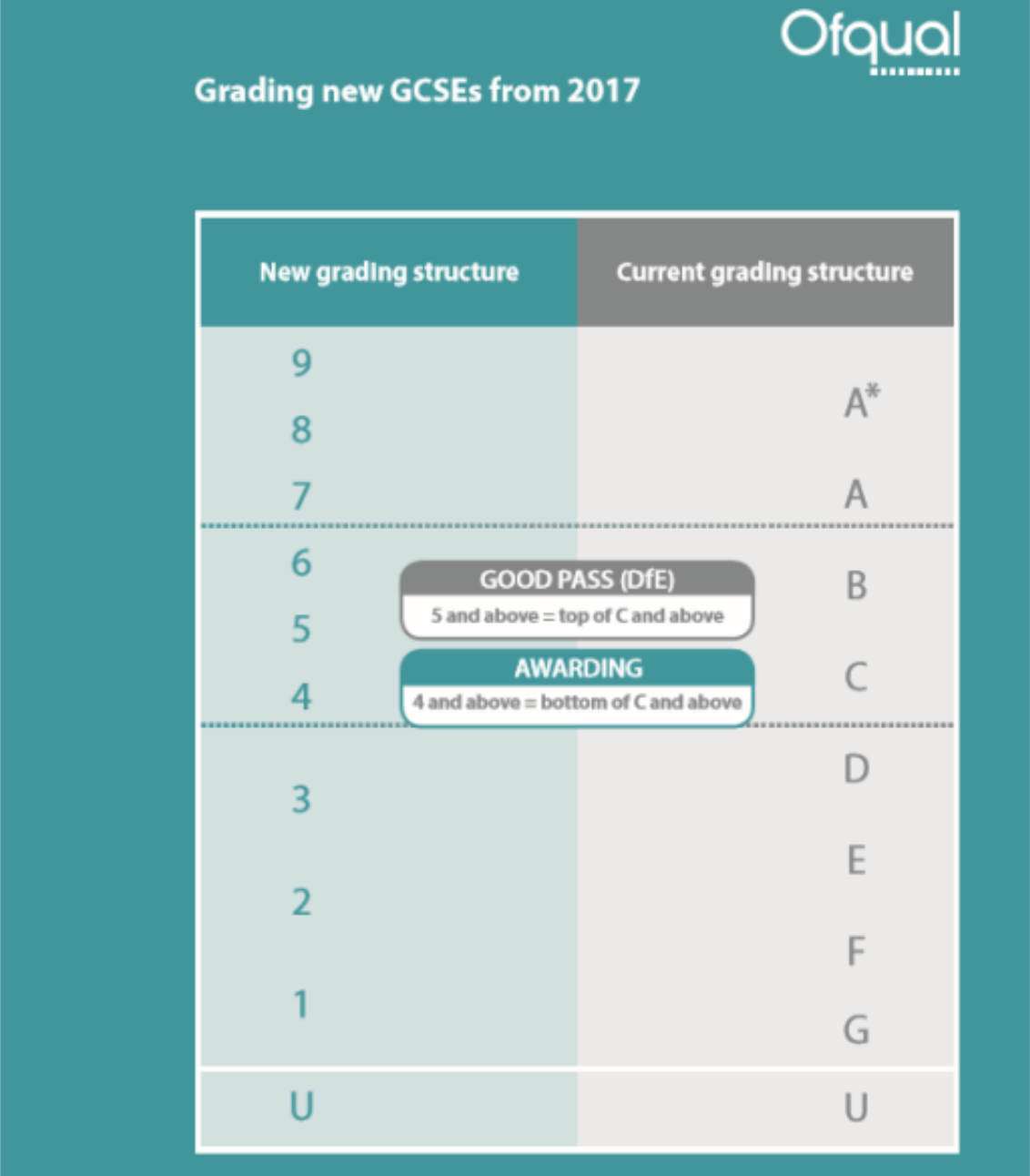
Maybe greater differentiation is good at providing a new level of challenge for those top achieving students across the country. However, I do not agree with some aspects of this change and have further questions as to why some of it was necessary. Firstly, the grade 9, which essentially creates an A** grade, is nothing original. The AQA Level 1/2 certificate (IGCSE) in Further Mathematics and a few select other qualifications have an A^ (A* with distinction grade), which is essentially the exact same thing, so why wouldn't the government have simply introduced the A^ across the curriculum? And my second criticism: why increase the benchmark to a low B or a high C, when students across the country are failing to meet the existing benchmark of a grade C and struggling to do so. 66.9% of entries achieved 5 A*-C in 2016, leaving 33.1% behind (SOURCE: GOV.UK & OFQUAL). Surely before increasing the benchmark the government should be trying to find ways to assist schools in helping those weaker students achieve the current PAGE 11 benchmark? Rather than leaving those students behind by increasing the bench mark even further. How about more resources? More teachers? New strategies?
This change to the GCSE doesn't seem to cause any kind of directly negative impact to the arts subjects, other than increasing the overall general standards required for a 'good pass' and providing greater challenge for those higher ability students studying the arts.
The second change to GCSEs, which also affects AS and A Level qualifications, is the removal of coursework and controlled assessment (unless it is absolutely necessary to assist a key skill within a subject) and a greater prominence of written theory exams. The government felt this was necessary as written exams 'are proven to be the most rigorous form of assessment'. This will severely affect the arts, subjects which are practical in nature, as it will limit the manner of which students can show their ability and reduce assessment accessibility.
Ins some subjects the effect of this is rather minimal, e.g. GCSE Drama, the old and new specifications have the same balance of written theory and practical examinations: it is simply the content that has changed. However, if a school was studying GCSE Expressive Arts for Drama, a new specification hasn't been created for it, so they are forced to transition to the new GCSE Drama specification; which means a transition from a GCSE with no written theory exam (this was assessed as controlled assessment and complimented the practical examinations) to a GCSE with a written paper. Music on the other hand, the weighting of their written theory examination has doubled at GCSE (from 20% to 40%). This may result in lower-ability students or students who don't perform well in written examinations being put off from studying the arts subjects as the specifications simply do not assess in a way that allows them to reflect their own ability. This is especially more damaging when the reputation of Level 1/2 BTECs (GCSE equivalent) within schools has been severely damaged thanks to a rather strong elitist criticism being shown to them by government; therefore, there isn't really an alternative to studying the newly reformed GCSE, therefore limiting the curriculum and putting constraints on what teachers can teach to their students and how they deliver what they teach.
Another change that is occurring to both GCSEs and A Levels is that 'there will be more, new demanding content, which has been developed by the government and exam boards with consultation with universities'. The content is where the new arts specifications mostly differ, for this I will be comparing AQA GCSE Drama (4240) (old specification) to the AQA GCSE Drama (8261) (new specification) and looking at the differences in the content between the two. The main difference lies in section B of both exam papers, where in the old specification the focus was on a student evaluating their own abilities and skills in respect to any text they have performed throughout their course whereas in the new specification they are asked to adapt a set-text (that they have studied) into a performance or design concept for the theatre. In the new specification, students must be able to talk about all disciplines (performance, design etc.) whereas in the old specification students can choose a question that suits their own specialism; this could potentially be damaging as rather than allowing a student to express what they are good at, they have to have a strength and essentially a bunch of 'mediocrities' or 'poor performances' within their final grade. In section A of the old specifications exam, students are expecting to describe, analyse and evaluate their own practical work whereas in the new specification students must answer many short-answer questions about general theatrical theory and terminology. In summary, the new GCSE has a more thorough theory element to it than the legacy specification which had a greater focus on personal evaluation, both have their pros and cons. The content of the new GCSE may be off-putting to students who wanted to study a course with a greater practical stance and therefore may result in a decrease in students opting to study at GCSE level. However, an advantage to the new course is that it is better preparation for the A Level as the content is rather similar and they feed into each other more closely.
Overall, the new reformed GCSEs may prove to be a factor in the reduction of students studying the arts in secondary schools. This may be due to the courses appearing to be less appealing due to their heavier theory content or due to timetabling hours being cut due to the new 'core subject' GCSEs requiring greater teaching time for students to succeed, therefore reducing the available time for the arts in timetables and a decrease in the feasibility for the courses to run.
Art is not a mirror held up to a reality, but a hammer with which to shape it.
- Bertold Brecht.
One of modern theatre's most influential pioneers stating how the arts can influence society and allow the people to be self-expressive.
Tell me and I forget; show me and I remember; involve me and I understand.
- Anonymous
I regard the theatre as the greatest of all art forms, the most immediate way in which a human can share with another the sense of what it is to be a human being.
- Oscar Wilde
Both quotes reflect how the arts are some of the most accessible subjects within modern society. They allow everyone to express themselves and develop interpersonal skills to boost themselves and others as individuals and human beings.
My Conclusion
To conclude, I believe that government education reforms are negatively impacting the uptake of the arts in schools at GCSE level. I believe that Michael Gove's backwards and outdated views on education have proven to be detrimental and will continue to do so as long as his successors continue to agree and follow them. The statistics provided prove that the arts are declining in popularity and I do believe this is due to the changes that have been incited since 2010 by the Conservative government; of the reforms, I believe that the EBacc is the most detrimental reform for the arts, with the effect of the new reformed GCSE/A Level specifications yet to be fully statistically observable. The education reforms are counter-intuitive and counter-productive, especially when the Arts are worth £79 billion a year to the UK economy (source: BACC FOR THE FUTURE). In a time of economic uncertainty, surely the government should be protecting such valuable industries? Especially when there is a threat of an upcoming skills shortage. It is extremely hypocritical to be adopting such backward systems and projects when it comes to education, especially when David Cameron and Theresa May have constantly been quoted as stating that the Conservatives are the party for Britain's future!
Education should be a politically-neutral area and constant change and meddling is what leads to confusion and standards not being transparent and clear for students and teachers. Subjects should not be excluded from any child's curriculum and their opportunities should not be constrained in favour of snobbery and political correctness. I believe that the Bacc For The Future campaign and many other organisations and individuals across the UK, questioning and constantly campaigning against the 'low-key' shunning of Arts subjects from secondary education are vital to our concerns being heard Both quotes reflect how the arts are some of the most accessible subjects within modern society. They allow everyone to express themselves and develop interpersonal skills to boost themselves and others as individuals and human beings. Page 14 by the government and provide a greater chance of this EBacc being adapted. An education that well-balanced, equal and fair for all is important to create well-rounded, skilled, intelligent, innovative and most importantly, happy young people; who contribute greatly to the UK's economy as adults in future years, providing economic security during uncertain times and protecting our most valued, respected and valuable industries whilst nurturing outstanding talent.
I believe the research I have collected clearly shows a correlation between a reduction in popularity of the arts within schools.
Thank you for taking the time to read my project. I will be thoroughly interested in finding out your opinions and arguments about the issues I have discussed.
- This piece originally appeared on my online Arts Award Portfolio.


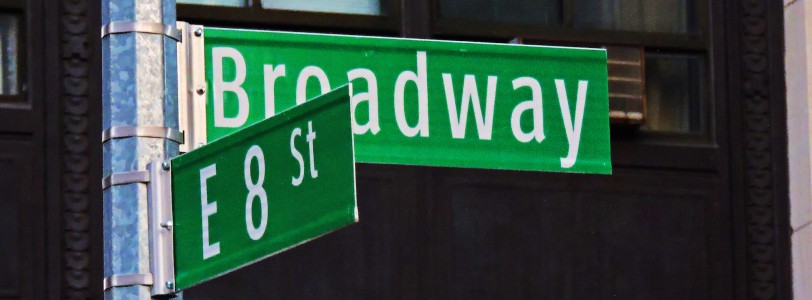




Great blog! It's sad to see the popularity of artistic subjects has gone over the past few years...